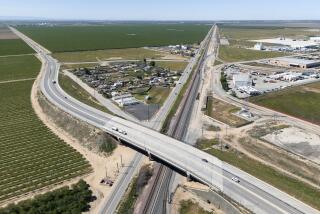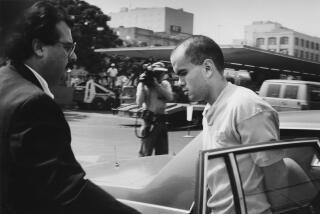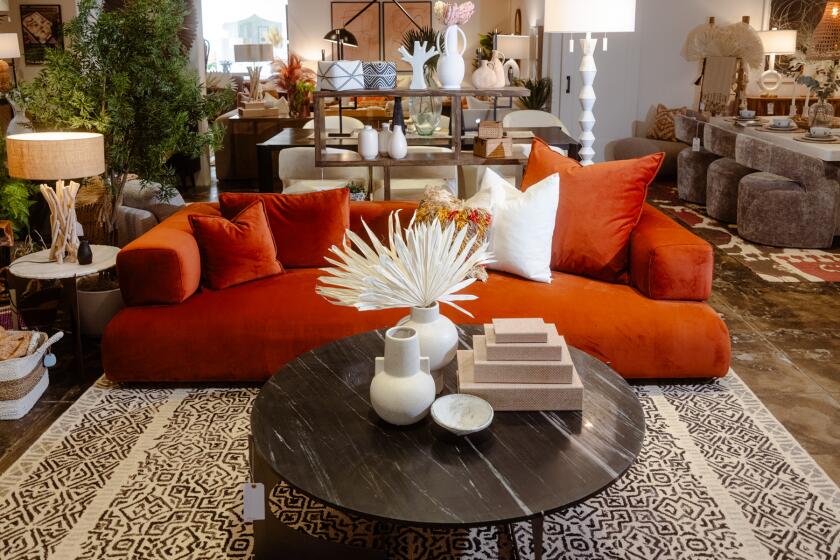Shop Centers Held Victims of ‘Political Fad’
Will everyone in Los Angeles who really thinks that the government of the city is more capable of designing interesting and attractive buildings than the architectural community please raise their hands?
Because that’s what we’re really talking about when we’re discussing the so-called “mini-mall ordinance.”
We are not discussing traffic problems. Every study ever undertaken has clearly shown that mini-malls do not increase traffic.
In fact, the studies have shown that mini-malls actually reduce total miles traveled by auto in Los Angeles by providing locations that are convenient to walkers and require fewer longer drives to major shopping centers. And most mini-mall customers are “drive-bys” who are passing by, anyway.
Parking Next to Homes
We are not talking about crime-related problems. An ordinance that would require parking at small commercial centers to be at the rear, out of the view of police and the general public, would actually encourage crime.
We are not talking about noise. Requiring that parking spaces be put in the back of the mall would--in most cases--mean that the cars would be parking next to homes. Everyone who was trying to sleep would share in the slamming of doors, the chatter of patrons, the honking of horns.
What we are really talking about is how mini-malls look. Let’s face it--some of them are really ugly. They are built by speculators, who rent them up quickly and then turn them over to inexperienced investor/operators.
They are erected as cheaply as the building codes allow, with a minimum of landscaping, apparently in competition to see who can come up with the worst signage. Their poor mix of tenants virtually guarantees economic failure. And with that impending failure, the inexperienced operator cuts back on maintenance, security and cleanup. Presto! One more junky place that runs down the community around it.
However, many mini-malls are built by experienced investors who keep and operate the buildings themselves. These investors build quality buildings, well-designed and well-landscaped, knowing that a nice appearance attracts not only good tenants but shoppers as well. They run them properly, nobody complains and the community is happy that the mini-malls are there.
Unfortunately, nobody seems to notice the good ones--only the bad ones. That’s human nature. So the hue and cry arises: “Stop the mini-malls!”
Latest Political Fads
In spite of the criticism often leveled at them, the fact is that politicians--particularly local politicians-- are sensitive to the expressed opinions of the people. And you can expect that when something like this starts blowing in the wind, they’ll be right on top of it. And they are. Nothing is wrong with that--it’s what we elect them for.
But we also elect them to take a good, long look at what the latest political fads call for on our behalf. Elected officials must make reasoned, thoughtful judgments and follow those judgments with reasoned, thoughtful legislation.
To start with, we might ask ourselves, “why are mini-malls built like mini-malls?” Simple. Because the basic L-shape design is the most efficient use of the many miles of highway-oriented commercial property that stretches throughout Los Angeles.
Using an L-shape provides the developer--and the small business tenant--with the most cost-efficient space at the lowest possible rent. Which means, of course, that the person with a little capital and a lot of guts can get into business a lot easier.
Is it any wonder that many of the new entrepreneurs in these mini-malls are immigrants from the Near, Far and Middle East? From Israel and Latin America and Eastern Europe? Isn’t that what America promises--opportunity?
Resemble Former Shops
Think about it. Mini-malls are much like the old-style sidewalk-oriented small shops of the 1920s and ‘30s, turned inside out. But parking has been taken from next to their residential neighbors and put in front, where people can conveniently use it.
That eliminates the curb-side loading and delivery that ties up parking spaces, interrupts traffic flow, and makes a general mess.
What will happen if we suppress mini-malls? First, the cost of new, small business space will go up. That means that the low-capital small businessperson either won’t go into business, or will go into business with a higher risk factor--and a higher failure rate.
Second, by putting the parking in the back, we will make it more convenient for criminals and vagrants to do whatever they do without the police or the general public observing it. And neighbors will raise a new hullabaloo because they can no longer quietly go about their living.
Third, we will discourage customers from visiting mini-malls because it will be harder to find a place to park. Decreased patronage will increase failures of mini-mall tenants and improve business at major shopping centers and gasoline stations.
Employment Sources
Fourth, we will discourage the 7-Elevens, the Jack in the Boxes and such from going into mini-malls, and encourage them to build their stores on a single lot without other shops. They will be in business long after the small businessman goes broke.
Fifth--and those of us with jobs seldom think of this--we will reduce the level of employment in the building industry, which employs 287,000 people in Southern California, and in small business, which employs a lot more people than big business.
So what can be done with the ugly mini-malls? An ordinance could be passed that requires all parking to be screened by landscaping, and that the landscaping be properly maintained. And if we’re worried about parking, we can increase parking standards citywide . That way we can handle all the nuisances, not just mini-malls.
But do we really need to hire an army of city employees to look over every architect’s plans on every commercial building in the city, and--shades of Fountainhead--substitute their judgment of the quality of design for the professionals?
That’s what one of the proposals currently before the City Council would do--all in the name of the current political fad, “stop the mini-malls!”
More to Read
Start your day right
Sign up for Essential California for news, features and recommendations from the L.A. Times and beyond in your inbox six days a week.
You may occasionally receive promotional content from the Los Angeles Times.






